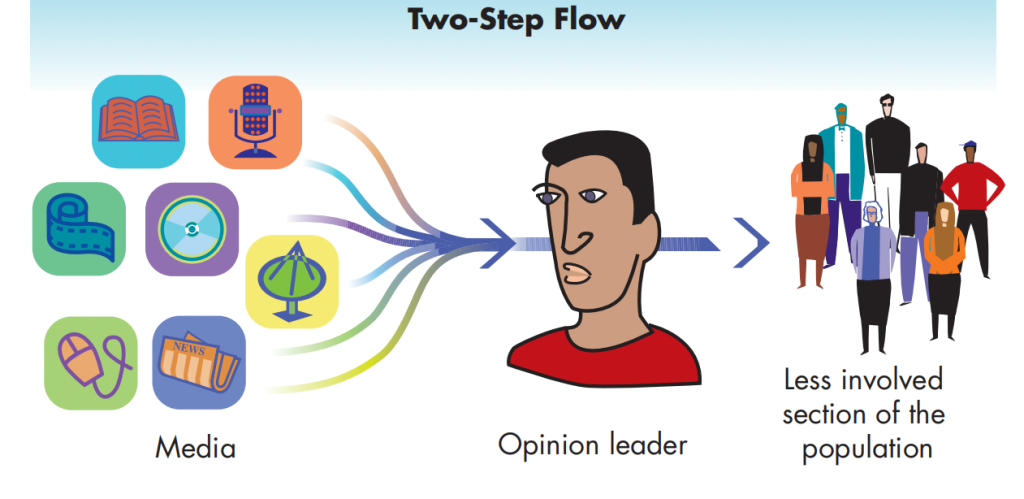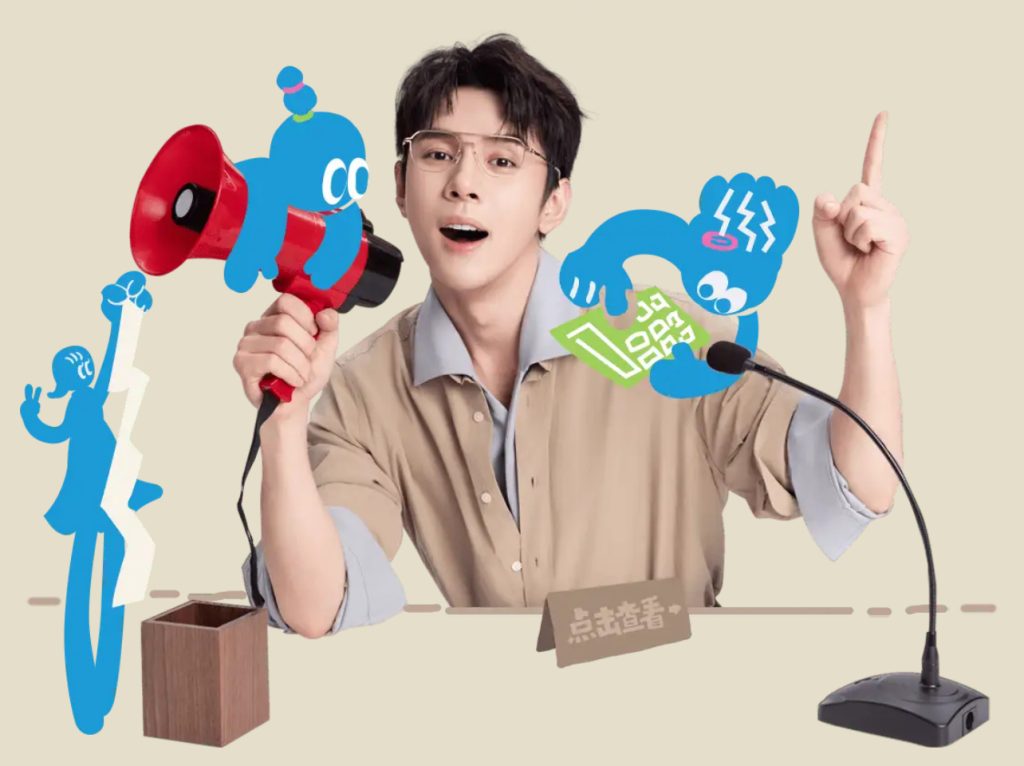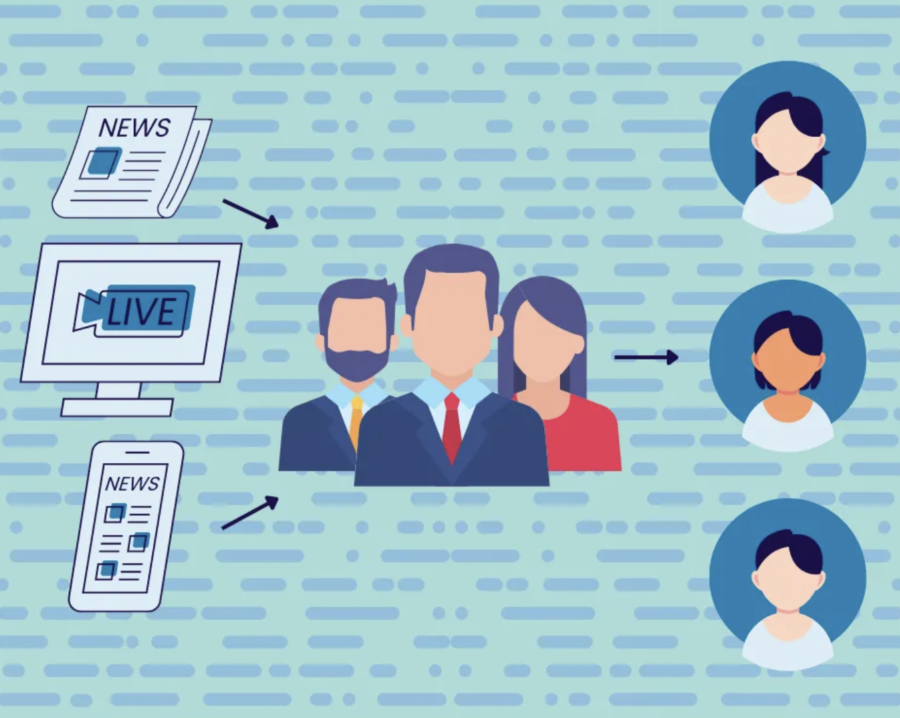Two-step flow:Communication process in which media effects travel through opinion leaders.

New media is an important channel for public opinion generation, new media is open to everyone, and the public can express their opinions and transmit information relatively freely on this open and interactive platform.
However,a crucialin point in terms of social mediaattention is that Internet users need opinion leaders, who are rich in knowledge, with distinct views and quick responses. They are good at expressing their views on various social media, focusing on social hot spots, and have a large number of fans, thus exerting great influence on public opinion.
Opinion leader :People who initially consumed media content on topics of particular interest to them, interpreted it in light of their own values and beliefs, and then pass it on to opinion followers.
The Core Principles (1992) document asserts that media literacy education requires active inquiry and critical thinking about the messages we receive and create. However, in recent years, some research institutions, such as Media in Latvia (2020), have conducted surveys on users’ new media literacy, and the results show that many users’ media literacy is weak in the new media environment. The main problem is that users lack rational cognition in media cognitive judgment. Therefore, to control the media information sender, the existence of opinion leaders is necessary. In new media platforms, opinion followers spread opinions of opinion leaders widely employing copying and forwarding, hence opinion leaders play a more prominent role in guiding public opinion.

To illustrate, Jiaqi Li, as a representative of the opinion leaders of Chinese online e-commerce platforms, is extremely popular in beauty and skin care. The ways he approves the products he recommends are by testing them personally, researching the efficacy of each product, and then telling the buyers the truth. While working steadily, he also thinks from the perspective of his fans, that is why people are willing to follow him and the social media affirming his reputation as an opinion leader.
Another particularly important point is that Audience acceptance shapes media and objective reality perceptions profoundly. Media reality is the basis of audience reality, Whether and how audiences accept media reports also affects or even controls their cognition of media reality and objective reality (Rodman, 2012). Reference to Social Cognitive theory (2010) reveals that people learn through observation, either as imitation or identification and the actual exhibition of these behaviours depends on the reinforcement we associate with them. Lawtoo (2022) argues that imitation is one of the oldest and most influential concepts in Western thought. In the current digital age, human beings are still imitative creatures, and people’s unconscious imitation is from the development of consciousness to education, from art to politics, and from virtual to real emotions. For better or worse, we are unconsciously shaped, deformed and transformed by the human tendency to imitate.
It goes without saying that humans are born with the instinct to learn and imitate, especially during the teenage years. Teenagers are in a critical period of the construction of their outlook on life, world outlook and values, and are easily affected by external environment. On the one hand, they have great curiosity and thirst for knowledge; on the other hand, they have a weak sense of right and wrong, and relatively poor self-control and discrimination. Therefore, they are easily affected by some unhealthy content on the Internet.

In addition, we should notice that the rapid development of media information transmission cannot be separated from electronic products, and television is one of the representatives. Turn on the TV and you will see a lot of negative social news, inappropriate plot plays and overemphasis on political topics. Many accidental injuries or crimes come from children and teenagers imitating TV shows or news reports. For example, when the Taiwanese idol drama “Meteor Garden” was broadcast, it was suddenly stopped, there are gangs and some violent scenes, which may be imitated, which is not conducive to the healthy growth of young people. To sum up, more measures should be taken in the education of teenagers to educate them on the right behaviour on the Internet, so as to avoid them being easily affected by the harmful content on the Internet.
Two-step Flow theory emphasises the importance of the opinion leader in media communication and helps us to understand the process of information dissemination. It is believed that in the changing and developing technology and media environment nowadays, Two-step Flow theory will also continue to adapt to the new environment in order to meet the needs of the new era.
Reference list
Hobbs, R. and Jensen, A. (2009). ‘The past, present, and future of Media Literacy Education’, Journal of Media Literacy Education [Preprint]. doi:10.23860/jmle-1-1-1.
Lawtoo, N. (2022). Homo Mimeticus A New Theory of Imitation. Leuven: Leuven University Press.
Rodman, G.R. (2012). Mass media in a changing world: History, industry, controversy. New York, NY: McGraw-Hill : Imprint of McGraw-Hill Co.

